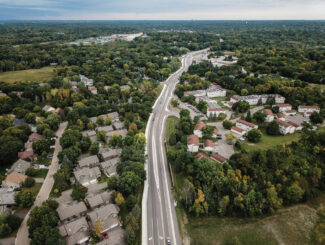by Brandon Movall
Jul. 6, 2017
Evidence strongly suggests that our climate is changing and will continue to change. Since the role of civil engineers is to plan, design, construct, operate, and maintain the world’s infrastructure far into the future, climate change – and the events associated with it – must be accounted for in all parts of a project.
Former American Society of Civil Engineers President H.G. Schwartz said, “If you think about all these extreme events – flooding, precipitation, drought, fires, etc. – they affect the built infrastructure and that is what we as civil engineers do; we design and build the infrastructure. Civil engineers need to know that [climate change] is an important factor as we develop infrastructure systems – be they highways and bridges, water or wastewater plants, power lines and transmission line [or] buildings, ports, [and] harbors. Almost everything we touch can be impacted by these [extreme] events. And then [we] need to ask: what are we going to do about it?” (Scott 2014).
In the Midwest, accelerated temperature rises, increased precipitation, and larger and more frequent floods have already made headlines around the region. These types of events have a direct impact on our cities and infrastructure.
Annual average temperatures have increased three times more rapidly over the last 20 years compared to the last 100 and are projected to increase more rapidly in the future. Civil engineers must try to predict new temperature highs and lows to create roads that will be able to handle more significant temperature changes. In addition, we must also create infrastructure that limits the reflection of heat waves back into the general population to decrease the number of heat-related mortalities. This can be achieved by using different materials, lighter colors, or designing around the pattern of the sun.
Overall precipitation has increased in the Midwest, by up to four inches per year in some areas. Designing and updating storm sewer systems to handle increased levels of rainwater is one of the main focuses for civil engineers today.
Finally, floods have also increased in size and duration over the last 50 years, causing billions of dollars in damage and often loss of life. We must plan for more intense flooding by strengthening existing infrastructure and considering how urbanization of the Midwest impacts our wetlands.
While these events are real and can sound troubling, civil engineers are focused on preparing for them and other unknowns that may be the result of climate change. Updating our infrastructure in smart and sustainable ways will ensure society is prepared for the future.
Sources:
Abraham, John, “Global climate projects help civil engineers plan,” The Guardian, May 27, 2017. https://www.theguardian.com/environment/climate-consensus-97-per-cent/2017/may/25/global-climate-projections-help-civil-engineers-plan
Scott, Doug, “Civil Engineers Have A Key Role to Play in Adaptation to Climate Change,” ASCE News, May 12, 2014. http://news.asce.org/civil-engineers-have-a-key-role-to-play-in-adaptation-to-climate-change/
Slater, Louise J. and Gabriele Villarini. “Recent trends in U.S. flood risk” Geophysical Research Letters 43, no. 24 (December 28, 2016): 12,428-36. doi: 10.1002/2016GL071199.
Melillo, Jerry M., Terese (T.C.) Richmond, and Gary W. Yohe, Eds., 2014: “Climate Change Impacts in the United States: The Third National Climate Assessment.” U.S. Global Change Research Program, 841 pp. doi:10.7930/J0Z31WJ2.
Mallakpour, Iman and Gabriele Villarini, “The changing nature of flooding across the central United States” Nature Climate Change 5 (February 9, 2015): 250-254. doi:10.1038/nclimate2516.
The National Academies of Sciences, Engineering, Medicine “Climate Change Will Have a Significant Impact on Transportation Infrastructure and Operations; Research, Tools, Action Needed to Pinpoint Vulnerabilities” March 11, 2008. http://www8.nationalacademies.org/onpinews/newsitem.aspx?RecordID=12179

